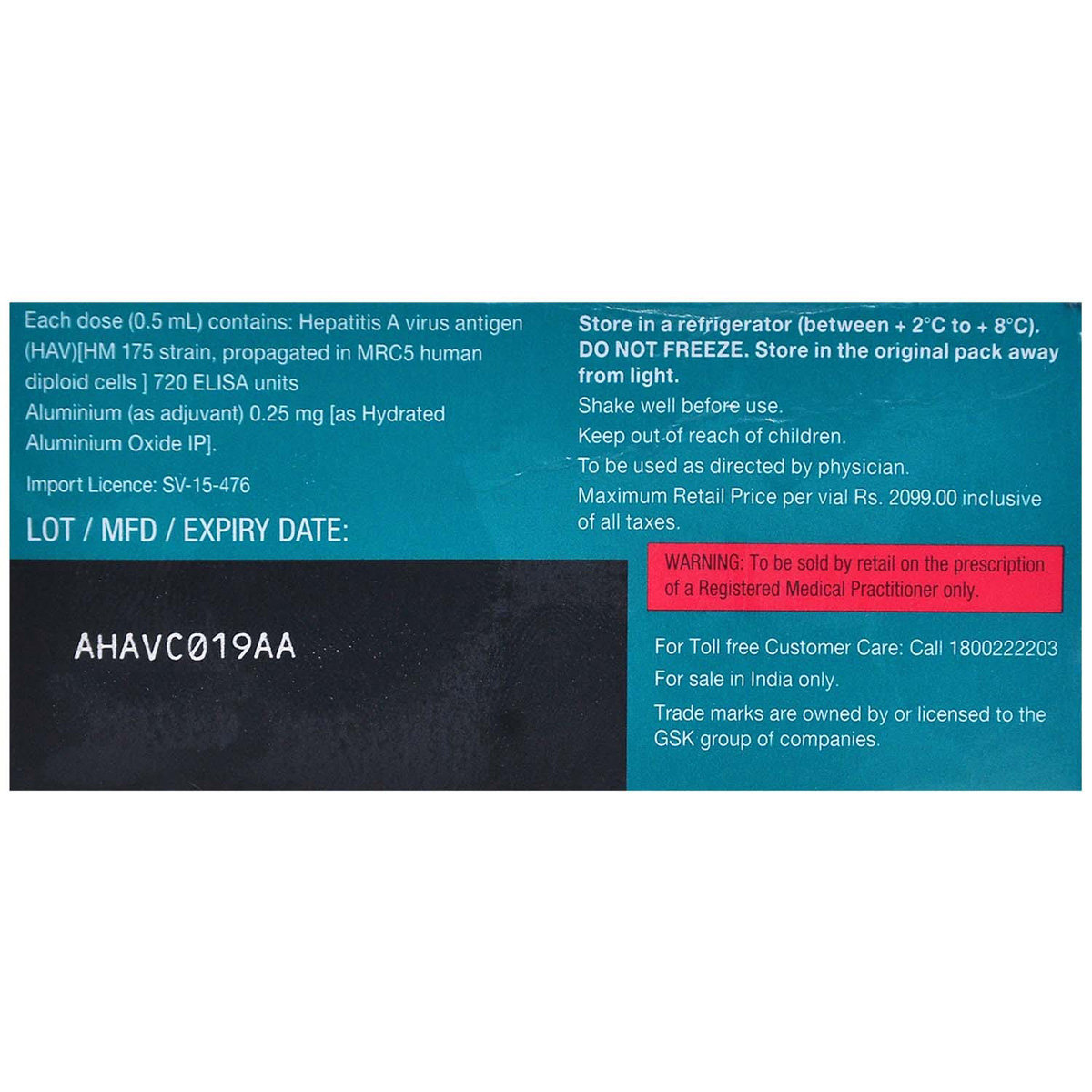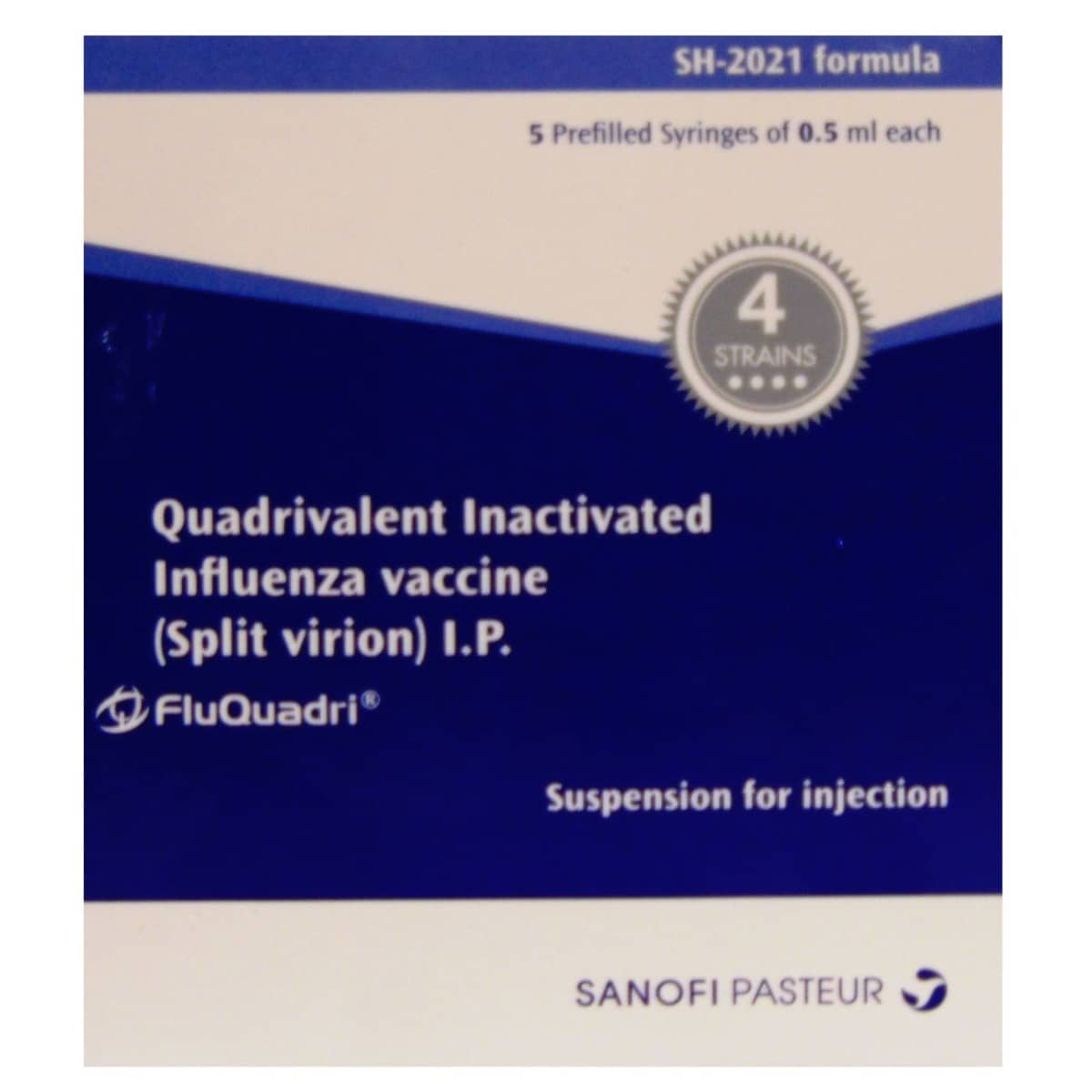Inactivated Hepatitis A Vaccine
About Inactivated Hepatitis A Vaccine
Inactivated Hepatitis A Vaccine belongs to the class of medication called 'biologics vaccines' or 'immunising agents' used to prevent hepatitis A infection. It is given before exposure to the hepatitis A virus or shortly after (within two weeks). Hepatitis A is a vaccine-preventable liver infection caused by the hepatitis A virus (HAV) spread by contaminated food or water and contact with infected persons.
Inactivated Hepatitis A Vaccine contains Hepatitis A antigen virus (Inactivated). It aids in the development of immunity by producing antibodies, which are proteins that protect against infection induced by viruses in the vaccine. A booster dose must be taken at the doctor's discretion for long-term protection.
Inactivated Hepatitis A Vaccine should be given by a trained healthcare professional. Inactivated Hepatitis A Vaccine may cause side effects such as pain and discomfort at the injection site, nausea and low-grade fever. These side effects are usually mild and temporary. However, if these side effects persist or worsen, inform your doctor immediately.
Let your doctor know before taking this vaccine if you are allergic or known to hypersensitivity to a component of the vaccine or any other products. Inactivated Hepatitis A Vaccine will not be administered to patients with an acute febrile illness. Let your doctor know if you are you are pregnant or breastfeeding. The vaccine should not be administered to pregnant and breastfeeding women unless absolutely essential. Inactivated Hepatitis A Vaccine can be given to children and elderly patients. However, dosage adjustments are necessary. Inactivated Hepatitis A Vaccine may not interact with alcohol. Inactivated Hepatitis A Vaccine may not affect your ability to drive.
Uses of Inactivated Hepatitis A Vaccine
Medicinal Benefits
Inactivated Hepatitis A Vaccine contains ‘Hepatitis A antigen virus (Inactivated)’, which can effectively prevent hepatitis A infection if given within two weeks post-exposure. Its use is recommended for children aged less than 12 months, people who are allergic to the vaccine or vaccine component or decreased response to the vaccine, who are travelling to an area where hepatitis A is endemic (prevalent in that region), who have weak immune systems such as with HIV, and who are at risk of long-term conditions of the liver such as hepatitis B or C infection. It helps to prevent infection in the household or other close contacts such as a person living in the same household as the infected patient, a person who had sexual contact with the infected person, child-care staff or a person who is taking care of an infected child, healthcare professionals administering injections to the infected person and persons living in long-stay care facilities which are sharing toilets or other facilities with the infected person.
Directions for Use
Storage
Side Effects of Inactivated Hepatitis A Vaccine
- Pain and discomfort at the injection site
- Nausea
- Low-grade fever
Drug Warnings
Let your doctor know before taking this vaccine if you are allergic or known to hypersensitivity to a component of the vaccine or any other products. Inactivated Hepatitis A Vaccine will not be administered to patients with an acute febrile illness. Let your doctor know if you are you are pregnant or breastfeeding. The vaccine should not be administered to pregnant and breastfeeding women unless essential. Inactivated Hepatitis A Vaccine can be given to children and elderly patients. However, dosage adjustments are necessary. Inactivated Hepatitis A Vaccine may not interact with alcohol. However, as a precautionary measure, it is advisable not to take or limit alcohol. Besides, inform your doctor if you had recently or plan to get vaccinated, especially MMR and varicella vaccines, as Inactivated Hepatitis A Vaccine can make these vaccines less effective. Also, do not take live vaccines within three months after taking Inactivated Hepatitis A Vaccine. Inform your doctor even if you feel unwell after taking Inactivated Hepatitis A Vaccine.
Drug Interactions
Drug-Drug Interactions: Inactivated Hepatitis A Vaccine may interact with live vaccines such as vaccine taken against measles, mumps and rubella (MMR vaccine).
Drug-Food Interactions: No interactions found.
Drug-Disease Interactions: Inactivated Hepatitis A Vaccine may interact with medical conditions, including acute febrile illness (body temperature of 37.5 degrees Celsius or higher).
Drug-Drug Interactions Checker List:
Safety Advice

Alcohol
cautionInactivated Hepatitis A Vaccine may not interact with alcohol.

Pregnancy
cautionPregnant women who are at risk of infection or severe outcomes from infection during pregnancy can be vaccinated with Inactivated Hepatitis A Vaccine. Consult your doctor in case of any concerns.

Breast Feeding
safe if prescribedInactivated Hepatitis A Vaccine is generally safe to be used in breastfeeding. Please consult your doctor in case of any concerns.

Driving
safe if prescribedInactivated Hepatitis A Vaccine may not affect your ability to drive.

Liver
safe if prescribedInactivated Hepatitis A Vaccine can be used in patients with liver diseases when clinically needed.

Kidney
safe if prescribedInactivated Hepatitis A Vaccine can be safely used in patients with kidney diseases if clinical needed.

Children
safe if prescribedInactivated Hepatitis A Vaccine is safe to be used in children when prescribed. Consult a child specialist for further advice.
Habit Forming
Diet & Lifestyle Advise
- Maintain hand hygiene as hepatitis A spreads with contaminated food and water. Hand washing after using the bathroom, changing diapers and before and after preparing food help prevent infection.
- Consume a balanced diet. Talk to a dietitian and prepare a diet plan.
- Avoid fatty foods and raw or undercooked foods.
- Avoid alcohol intake.
- Maintain a healthy weight.
- Undergo screening for hepatitis if you are caring for or living with an infected person.
- If you have diabetes, do not share your blood sugar meters, blood lancets or other equipment with other people, as it may cause the spread of infection from one person to another.
Special Advise
- Inform your doctor if you have blood tests after taking Inactivated Hepatitis A Vaccine, as this medicine may alter the results of the blood test.
Patients Concern
Disease/Condition Glossary
Hepatitis A: Hepatitis A is an infection of the liver caused by the hepatitis A virus (HAV). It is preventable through effective vaccination. It spreads through contaminated food or water and contact with infected people. Symptoms of this condition include abdominal pain, nausea, loss of appetite, fatigue, dark urine, yellowing of the eyes and skin, clay-coloured stool, and fever. Adequate rest and hydration can aid in a quick recovery.
FAQs
Inactivated Hepatitis A Vaccine contains Hepatitis A antigen virus (Inactivated). It aids in the development of immunity by producing antibodies, which are proteins that protect against infection induced by viruses in the vaccine. For long-term protection, a booster dose must be taken at the discretion of the doctor.
Taking live vaccines such as MMR (measles, mumps, and rubella) and varicella (chickenpox) vaccines within 3 months of taking Inactivated Hepatitis A Vaccine is not recommended. Inactivated Hepatitis A Vaccine may alter the action of these vaccines, making them less effective.
The hepatitis A vaccine stimulates the immune system to produce antibodies against the hepatitis A virus (HAV) and provides long-term protection against the virus. On the other hand, hepatitis A immunoglobulin contains antibodies that act against HAV and is given when immediate protection against the virus is needed.
Hepatitis A, Hepatitis B and Hepatitis C are three different viruses that cause severe liver infection. Though each virus of hepatitis can cause similar symptoms, they are spread in different ways and can affect the liver differently. Hepatitis A causes short-term infection. While Hepatitis B and C can begin with short-term infections, in some cases, can cause chronic or lifelong infections. There are vaccines to prevent hepatitis A and hepatitis B, but no vaccine is available for hepatitis C.
Inactivated vaccinations are another type of vaccine in which the virus is inactivated during manufacturing.
Inactivated Hepatitis A Vaccine should be stored in a refrigerator (between +2°C and +8°C). Do not freeze; destroy the Inactivated Hepatitis A Vaccine if it has been frozen.






